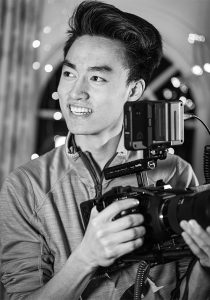NOTHING, EXCEPT EVERYTHING – Directed by award-winning Wesley Wang who was winning awards before he started high school. Starring David Mazouz and Lily Chee. Produced by Scott Aharoni. NOTHING, EXCEPT EVERYTHIG won a Grand Jury Prize at Oscar-qualifying Indy Shorts International Film Festival.
Q&A
Edited for WORD Style and Context
WORD Editor:
So how long did it take you to make this film?
Wesley Wang: From start to finish, about a year.
WORD Editor: There here seems to be a lot more interest with filmmakers to make short films instead of working on a feature but there, there’s some kind of strategy to it. It isn’t that they’re just making a short film, but there’s a possibility that this short film, sometime in the near future or the far future, can become another project or a bigger project. A feature. And this is a way to sort of test the waters?
Wesley Wang: Yeah, a lot of, a lot of people make short films so that if audiences respond to it then they’ll make it into a feature film.
WORD Editor: So, are you thinking about a feature?
Wesley Wang: Yeah.
WORD Editor: Okay. So if you’re thinking about a feature, you might also be thinking about a TV series. Okay. So this is like a seed that’s planted, that’s going to flower sometime in the near future or depending on what your schedule is.
Wesley Wang: Hopefully.
WORD Editor: What would, what would be some of the things you might do in a feature that you didn’t do in the film short because you were trying to keep it as a short film but you might be expanding on for a longer film or feature films.
Wesley Wang: That’s a good question. I think I would expand it towards, we would go much more in depth with his relationships with all his characters. And also I want to add a sci-fi element to it. So we, I’ve already written a feature script, actually, so I already have like, have the whole story down and everything. It’s pretty different from the short, but it has a lot of the same style and themes, but the story is very different because there’s a whole sci-fi element to it. {Editor’s Note: Wang already has a feature film tentatively scheduled to be release in the near future. He’s definitely on a run, so-to-speak.}
WORD Editor: Okay. So can you gimme a little hint about the sci-fi element?
Wesley Wang: Yeah. So, he (Miles) believes that the world is simulated. Like we live in a simulation and he tries to code a better simulation that we could all go into, basically. So that’s the premise.
{He was asked about which filmmakers influence him the most?}
Wesley Wang: Yeah. Yeah, I definitely have big influences. I think Paul Thomas Anderson is one of my favorites. Damien Giselle. Christopher Nolan. Robert Baram. David Lynch.
Wesley Wang: Yeah, so we just played at India in Indianapolis. That was our world premiere … we’re just going to keep going around on festivals and then once that’s finished ,we’ll put it up online.
{Wang was asked when he got into film.}
Wesley Wang: When I was around 12, I watched, started watching movies a lot and that’s what really got me into film because I was always thinking about how, how I can make people feel the way I felt after watching a good movie because they were very <inaudible> and inspiring and changed the way I saw the world. I always wanted to express my own vision into a movie from that point on.
WORD Editor: Okay. So you, you started off watching; what equipment did you start using to make your own films? Like, what was your first film that you made for people to see?
Wesley Wang: Yeah, it was, it was funny, it was like a really, really small film. I was 11 or 12. It was called THE STRANGER, named after the Billy Joel album. It was a detective … a detective in a serial killer movie and my dad played the detective and my brother’s friend played the serial killer.
So it was just really, really terrible equipment, like some DSL cameras, like a Canon that cost 200 bucks or something. And then, yeah, it was just very, very, very low budget and shot it in one day and edite and showed it for some people. But that’s how everyone starts off. You learn a lot by that process.
End Part 2. Return to Part 1.
Gregg W. Morris can be reached at gregghc@comcast.net, profgreggwmorris@gmail.com
